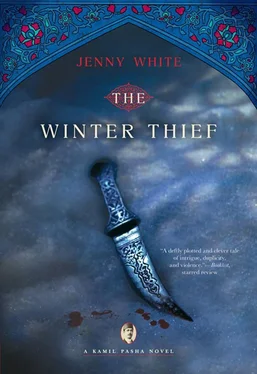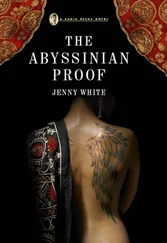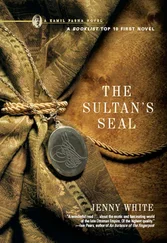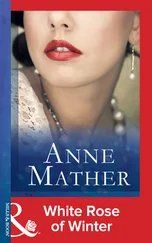Jenny White - The Winter Thief
Здесь есть возможность читать онлайн «Jenny White - The Winter Thief» весь текст электронной книги совершенно бесплатно (целиком полную версию без сокращений). В некоторых случаях можно слушать аудио, скачать через торрент в формате fb2 и присутствует краткое содержание. Жанр: Исторический детектив, на английском языке. Описание произведения, (предисловие) а так же отзывы посетителей доступны на портале библиотеки ЛибКат.
- Название:The Winter Thief
- Автор:
- Жанр:
- Год:неизвестен
- ISBN:нет данных
- Рейтинг книги:5 / 5. Голосов: 1
-
Избранное:Добавить в избранное
- Отзывы:
-
Ваша оценка:
- 100
- 1
- 2
- 3
- 4
- 5
The Winter Thief: краткое содержание, описание и аннотация
Предлагаем к чтению аннотацию, описание, краткое содержание или предисловие (зависит от того, что написал сам автор книги «The Winter Thief»). Если вы не нашли необходимую информацию о книге — напишите в комментариях, мы постараемся отыскать её.
The Winter Thief — читать онлайн бесплатно полную книгу (весь текст) целиком
Ниже представлен текст книги, разбитый по страницам. Система сохранения места последней прочитанной страницы, позволяет с удобством читать онлайн бесплатно книгу «The Winter Thief», без необходимости каждый раз заново искать на чём Вы остановились. Поставьте закладку, и сможете в любой момент перейти на страницу, на которой закончили чтение.
Интервал:
Закладка:
Kamil looked confused. He had disembarked only a few hours earlier and had come straight to the palace. He saw the sultan motion to the vizier, and after a few moments, the man returned with a stack of foreign newspapers.
Although the vizier’s every outward motion was unfailingly polite, as he bent to hand Kamil the papers he caught his eye, and Kamil felt a wave of hatred and fear communicated in that look. Kamil wondered what could make a formidable man like the vizier so afraid. He recalled the rumors that the vizier’s son had murdered his friend. If Vahid had engineered a cover-up, he would be in a position to threaten the vizier’s family and reputation, and that was a threat that could bring low the most powerful man.
Kamil flipped through the stack of newspapers in his lap. The front page of the The Times of London showed a grainy photo of makeshift shelters in Trabzon. The headline announced: PASHA PAYS FOR ARMENIAN RELIEF. The New York Tribune read: OTTOMAN LORD RESCUES ARMENIANS. A rather inaccurate drawing of him with an oversized nose and bristling mustache showed him protectively holding his fez, in which a miniature huddle of threadbare women and children were sheltering. There was more of the same, in every language.
Kamil was stunned. “This is wrong.”
The sultan smiled at him. “Enjoy your fame, Kamil Pasha. To thank you for your service to the empire, I am bestowing on you the High Order of Honor and a yali mansion in Sariyer. May you be happy there.”
Vizier Köraslan held out a velvet-covered box, its lid open. Sultan Abdulhamid asked Kamil to approach. The sultan stood, took the High Order of Honor from its case, and lifted the sash over Kamil’s bowed head. It was an eight-pointed gold star with a central medallion bearing the seal of Sultan Abdulhamid II. It was surrounded by four green enamel banners on which Kamil read the words “patriotism, energy, bravery, fidelity.”
“I congratulate you and thank you for your service to the empire.”
“Thank you, Your Majesty,” Kamil stuttered, overwhelmed and greatly disturbed. He bowed his head.
The sultan sat back down. “Oh, and did you discover the missing gold from the bank?”
“No, Your Highness. I’ve failed in that. The perpetrator is dead, so we may never know what happened to it.” Kamil noted dispassionately that he felt only a slight twinge of guilt at lying to the sultan. What else could he have said? The truth, that he had spent half of that stolen gold saving the lives of hundreds of people, presented a moral conundrum that he felt unable to solve. He had chosen life over honesty, one kind of justice over another, but he knew not everyone would agree that he had chosen well. He was certain that the vizier wouldn’t agree, but he wondered what the sultan would think.
“I see.” The sultan tapped his fingers on the chair arm and regarded Kamil thoughtfully but said nothing more. He lifted his index finger, and the vizier stepped forward to signal an end to the audience.
As Kamil backed out of the room, his mind was on something Vera had told him. “Karl Marx,” she had said, “believes that money is like a living being that divides and multiplies, so that those who have it gain ever more, while sucking the life from those who have none and never will.” At the time he had thought it an exaggeration.
94
“Ayali! How wonderful.” Feride clapped her hands at the thought of her brother living in a seaside mansion. Sariyer was north of Bebek, where Yorg Pasha lived, and accessible only by boat, but she knew the wives of several pashas who summered in the area. The mansion Sultan Abdulhamid had given to Kamil had belonged to the late Sultan Abdulaziz’s daughter. When she married and moved to her husband’s mansion, the house on the waterfront had reverted back to the palace. “I’ve seen it,” Feride told Kamil. “It’s lovely, a huge place. Much too big for you,” she concluded with a smile.
Feride was already making plans to visit. Her daughters would love to be closer to the water. Their mansion in Nishantashou had a big garden, but nothing was better than being able to step directly from your terrace into a caïque on a moonlit night and picnic on the water. It would do Huseyin good too to get away from this house that had been his prison for so many months. After his visit to the palace, he had developed a painful cough and for a time had become so incapacitated that she had worried he might die. Now he was on the mend, although still weak. There had been no opportunity for the reconciliation she had planned with her husband, but the tension between them had disappeared, replaced by an awkward caution.
“You’d better put your name on the door, Kamil,” Huseyin joked. “Your sister is already arranging the furniture.”
She leaned over and kissed her husband’s brow, leaving her lips in place for a moment to feel the warmth of his skin against hers. He smiled in return and squeezed her arm, but she saw the hesitancy in his eyes. There was a smear of puckered pink flesh across his cheek. He still walked with a cane, and his body was seamed with scars. He had insisted on sleeping in a separate bedroom. He hadn’t understood her tears and protests over his doing so, she thought. Had she become his nurse and nothing more? Did he no longer wish her to see his body? Perhaps she should have acquiesced quietly, but she was determined to win her husband back.
She stood by her husband’s chair and wondered when, if ever, he would draw her onto his lap again.
95
The Minister of Justice, Nizam Pasha, fitted the torn scrap of paper against a page in Vera Arti’s passport. It was written in Cyrillic, with stamps and signatures, and at the bottom a translation in French. They were in his private chambers, sitting in armchairs before the minister’s desk.
Kamil handed the minister another document. “This is Vera Arti’s deposition, her account of being forcibly abducted by Vahid and kept in Akrep’s basement, along with the murdered woman, Sosi. The passport fragment we found confirms she was there,” Kamil continued. “And it gives credence to her claim that she saw Sosi also being held there and that the girl probably died there.”
“There’s no proof of where and by whom Sosi was killed,” Nizam Pasha corrected Kamil, “but this evidence is very indicative.”
“The girl feared for her life. Vera reported seeing wounds on Sosi’s hands of the kind documented by the autopsy, the same kind of wounds that I saw had been inflicted on Bridget, the British governess. They clearly were made by Vahid,” Kamil insisted. “These are the actions of a man with no respect for human life.”
“You think it was Vahid. But there’s no proof that he killed Sosi or anyone else. It could have been one of his men.”
It took all of Kamil’s willpower not to rise from his chair and smash something. It was as if all the violence of the past months had crept into him and now threatened to uncoil. But respect and protocol required him to remain seated in the presence of the minister and to hide his uneasiness. He needed Nizam Pasha’s help to hold Vahid to account for his cruelty. If not Vahid, then who was responsible for all the deaths in the Choruh Valley? He felt a deep personal grudge as well. Kamil hadn’t forgotten his four nights in Bekiraga Prison or Sakat Ali’s attempt on his life. If Omar hadn’t been awake to stop the Akrep agent, Kamil would be dead.
“This should be enough to exonerate you.” Nizam Pasha waved the documents in the air. “The Order of Honor alone will make this charge go away. The sultan isn’t in the habit of rewarding his subjects with the empire’s highest honor one day and throwing them in jail the next. You should take care, though. Vizier Köraslan has taken a special interest in you, first jailing you in that outrageous manner and then pushing for a trial. Aside from the fact that it’s an affront to our class, I don’t approve of officials from the palace messing about in the business of the courts. The vizier should stick to matters of state.” He pointed his pipestem at Kamil. “You’ve made a powerful enemy there, Kamil, but you seem to have a talent for that.”
Читать дальшеИнтервал:
Закладка:
Похожие книги на «The Winter Thief»
Представляем Вашему вниманию похожие книги на «The Winter Thief» списком для выбора. Мы отобрали схожую по названию и смыслу литературу в надежде предоставить читателям больше вариантов отыскать новые, интересные, ещё непрочитанные произведения.
Обсуждение, отзывы о книге «The Winter Thief» и просто собственные мнения читателей. Оставьте ваши комментарии, напишите, что Вы думаете о произведении, его смысле или главных героях. Укажите что конкретно понравилось, а что нет, и почему Вы так считаете.












